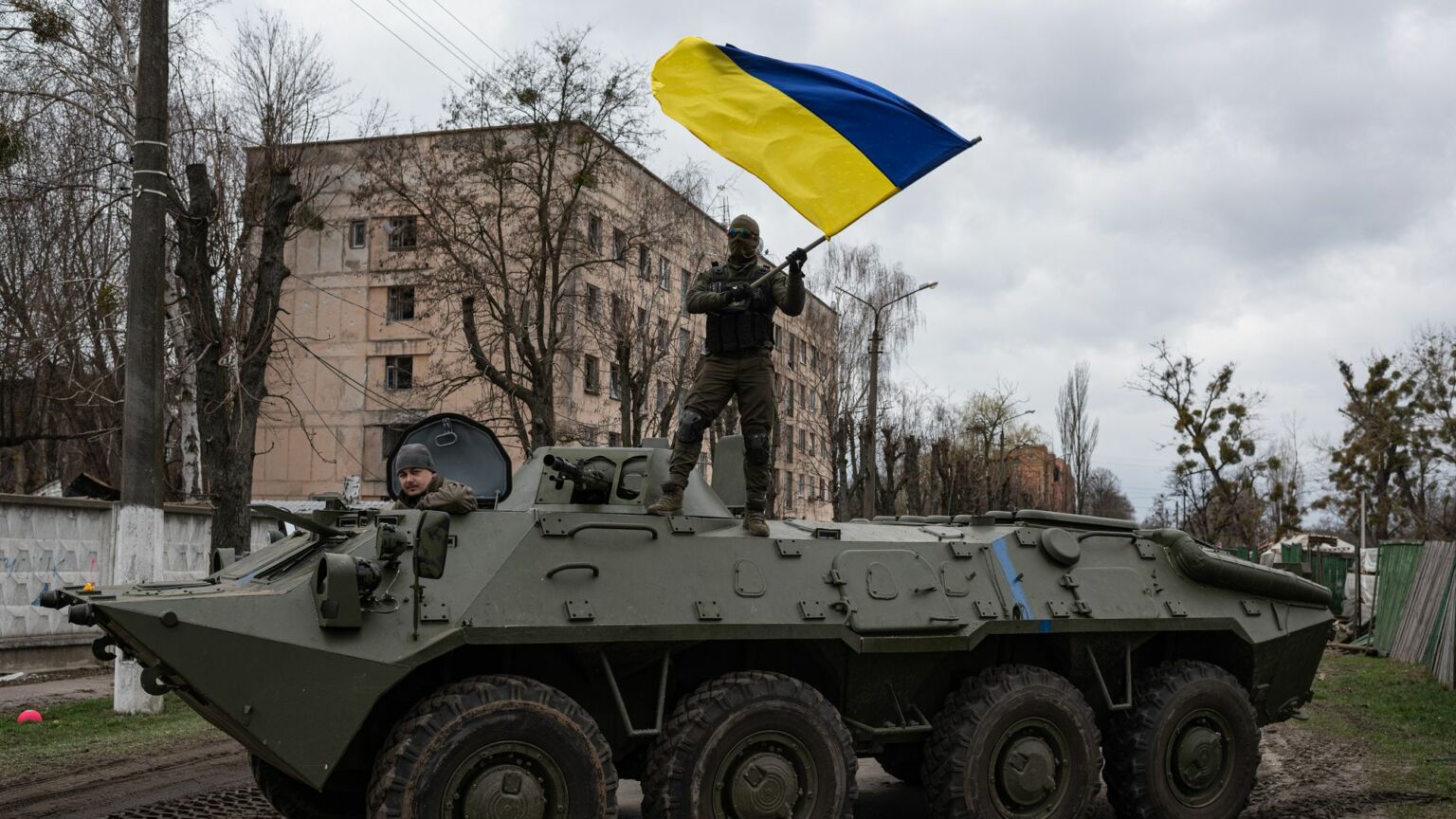Ukraine’s fight for freedom has not been in vain
The legacy of Ukrainians’ stand against Russia will live on.

Want to read spiked ad-free? Become a spiked supporter.
Nearly three years on from Russia launching its full-scale invasion of Ukraine, it is worth reminding ourselves what was supposed to happen. According to Western observers, Russia’s ‘modernised’ military was going to take Kyiv ‘in three days’. All that was left to do was to encourage Ukrainian president Volodymyr Zelensky to do the responsible thing and leave Ukraine to form a ‘government in exile’. Instead, Zelensky rejected the ‘wisdom’ of the West – not for the first or last time – and Ukraine shocked the world by showing it could fight on.
Today, the situation remains perilous. By some estimates, Ukraine’s energy system hangs in the balance. Repeated strikes by Russia have knocked out over half of Ukraine’s power-generation capabilities as winter deepens. The battlefield prognosis is also grim, with Russia gaining territory at a faster pace as each month goes by. Shortages of men, weapons and morale mean Ukraine is once again on the back foot.
Vladimir Putin is clearly enjoying the feeling of being able to turn the screw. His annual end-of-year telethon this month featured a macabre invitation to a ‘duel’ between Western air defences and Russia’s new ‘Oreshnik’ missile. He said this contest should be held, naturally, in the skies over Kyiv.
Putin’s increasingly belligerent tone is, in part, an attempt at positioning ahead of the peace talks to come, which many think are inevitable once president-elect Donald Trump takes office in the US. Much hangs on whether Trump can make good on his promise to bring a quick end to the war.
But much remains unclear. Can Trump really bring Putin to the negotiating table? Will he be able to force Ukraine to accept an unfavourable deal? Can he encourage or blackmail European leaders into taking more responsibility for Europe’s defence?
Any negotiations will be difficult, as Ukraine and Russia seem to have mutually incompatible red lines. Putin wants a rump Ukrainian state that he can bend to his will. Zelensky insists on the need for security guarantees of some sort from the West. Neither position provides much basis for a compromise.
Despite all this, there is actually a cautious welcome awaiting Trump from the Ukrainian side. Whatever Biden’s policy was (it has been best described as a commitment to ‘not let Ukraine lose too quickly’), it was clearly unsupportable in the long-run. The incoming president’s unpredictability – which may well have stopped Putin from launching his invasion during Trump’s first term – may turn out to be a better basis for bargaining. For Ukrainians, a roll of the dice could be preferable to their slow, grinding losses.
Frustration with the war is mounting. Corruption remains a major issue, and many question whether continuing the fight is sustainable as Western support wanes. After all, the toll the war is taking is staggering. Recent Western demands for Ukraine to lower the mobilisation age to 18, while failing to adequately equip or train existing brigades, strike many as callous or worse. Ukrainians have long known that Western support is not entirely altruistic, but some now ask openly whether the West aims to bleed Ukraine dry.
Polls in Ukraine indicate an increased openness towards negotiations, but there is still no indication that the bravery and defiance that has characterised Ukrainian resistance is going anywhere anytime soon. Even if some territorial concessions can be stomached, Russian vassalage over what remains of Ukraine cannot. Whatever awaits Ukraine in the new year, there is no undoing the legacy of its stand against Russia.
Russia’s increasingly hostile anti-Westernism cannot be forgotten, either. Whether or not European troops eventually find themselves on peacekeeping missions in Ukraine, Europe must prepare for a new era of hostile relations with Russia. Reports of stepped-up Russian sabotage operations across the continent seem plausible. Indeed, why wouldn’t a nation under attack by Western-supplied weapons retaliate covertly?
Yet Europe remains as divided as ever on how to deal with Russia. In Germany, the insurgent AfD has pledged to sacrifice Ukraine in return for cheap Russian gas. The EU’s new top diplomat, Kaja Kallas, delivers speeches against Putin that may sound bold, but offer little in the way of substantive strategy. Neither the populists who want to hug Putin close, nor the technocrats who love to hate him, are grappling with the scale of the challenge Europe now faces.
More fundamentally, there is no undoing the legacy of the Ukrainian resistance. Whatever Ukraine decides to do next, it has already been transformed by the war. Despite real and enduring divides within Ukraine, there is now no doubting its coherence as a nation. Ukrainians held firm against Russian aggression, even before the West arrived with help, because they knew they had a nation worth fighting for. What’s more, while this year has been a slow, brutal grind, the Ukrainians have undoubtedly stopped Russia from making the scale of territorial gains that, at the start of the war, defeatist Westerners seemed to think were inevitable.
As unclear as Ukraine’s future looks right now, the heroism of the past three years will live on.
Jacob Reynolds is head of policy at MCC Brussels.
Picture by: Getty.
Who funds spiked? You do
We are funded by you. And in this era of cancel culture and advertiser boycotts, we rely on your donations more than ever. Seventy per cent of our revenue comes from our readers’ donations – the vast majority giving just £5 per month. If you make a regular donation – of £5 a month or £50 a year – you can become a and enjoy:
–Ad-free reading
–Exclusive events
–Access to our comments section
It’s the best way to keep spiked going – and growing. Thank you!










Comments
Want to join the conversation?
Only spiked supporters and patrons, who donate regularly to us, can comment on our articles.